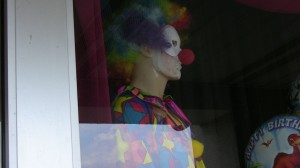I want to talk about shows in theatre and dance that deal with the audience head on. In other words, works that acknowledge the existence of the audience as part of the performance experience. Throughout the years, I’ve seen a number of shows in this genre asking the question: what is dance or what is theatre or what is art? Concerned with the audience experience, these shows are interested in breaking down the artificial boundaries between performer and audience.* The goal is for the audience to experience something real, and so we all have a shared experience that is genuine.

These performances used to be more audience-hating driven, in that vein of “You who sit there, watching art, how dare you? Let me expose you to the light and each other!” [Cue house lights.] Thus antagonizing the audience for their complicity in erecting the false boundaries between audience and performer—the performer being some sad creature spilling his soul for the cathartic benefit of the masses. Did you ever think of the performer? What it takes out of him, night after night? While for you, this is just another night at the theater, some amusement to indulge in after your coq au vin? You fucking bastard ass!
This antagonist approach is no longer so widespread, perhaps for the simple reason you cannot seriously believe that the small gathering of people who have come to see your weird show in anyway represent a mass audience or the general public.
What sparked my interest in the subject came from seeing a piece in which the artist was concerned with creating something that the audience would experience as real, where the audience would be fooled into thinking that what was going on onstage was actually occurring to the actor(s), not their characters, and thus the audience would have a genuinely real** emotional experience, thus transcending ordinary performance. What’s interesting to me is the supposition that what the audience experience is somehow fake. That, because you are witnessing a show—something that is essentially pretend, a charade designed to evoke emotion, thought, sympathy, etc., through illusion—what you, as a member of the audience, experience is somehow not real.
Is this not a misreading of audience experience in the performing arts? The flaw in this entire assumption is that the audience is ever having a non-genuine emotional reaction no matter what kind of show it is. When you are an audience member, and you are either laughing hysterically or crying your eyes out, those emotions are very real—if you were notgenuinely experiencing those emotions you would not be having such an uncontrolled emotional reaction. Just because some part of you knows this is an enactment, a ceremony, whatever, does not undercut the authenticity of your emotional response or investment. Yes, if it were real, and someone was being knifed to death on stage, you would (I hope) try to prevent it from happening or call 911. (I guess you could also leave the theater and begin whistling.)
When you are in the audience, and are invested emotionally/experientially in the show, a barrier is being brought down between your conscious and subconscious (or maybe it’s the unconscious, but you get the idea). That is a very real experience, just as a dream is a very real experience to the person dreaming it. That you wake up and realize that you aren’t still in your 7th grade Spanish class without your pants on does not mean what you were experiencing just seconds before wasn’t genuine.
There is nothing wrong with a performance deconstructing the audience experience, and in the right hands, good things can come of it. But often the idea creeps in that somehow areal event, or having the audience think they are experiencing a spontaneous episode that will stand up to historical scrutiny, is a more worthy attainment than a performance (with all its implied “dishonesty”) says a lot more about the creators/performers behind the piece than the audience.
The only one who is being fake in a performance is the performer. It is the performer, no matter what her day was like, who, beginning at 8:16***, is manipulating her emotions and movements in order to fool an audience into having a genuine reaction to the illusion she creates. This seems the obvious answer as to why some performers are so obsessed with the idea of creating a real experience on stage, that they and the audience seemingly connect in this we-are -sharing-a-real-moment-together, because it is only the performer who doesn’t understand that the audience is always experiencing real emotions—the performer is the one most missing out from the genuine experience created by the performer.
(That doesn’t mean the performer isn’t having an experience as well—it is only a different experience. I’m not sure why having a different experience should be a bad thing, however, because you are still all experiencing something in the same time and place, which couldn’t be more natural. Performing arts people just need to get out more.)

The irony is that shows that seemingly become real, or have built in moments of open-ended unpredictability, are still fabrications, whether by script or design. The drive to question and have an honest experience with the audience is still a construct of the performance.
This is not to dismiss works that like to question the “contract” between performers and audience members, or that take on ideas of what constitutes a performance or that challenge people’s precepts of a play or dance, etc. I’ve enjoyed a number of such works, particularly when those creating such shows have a sense of humor and mischief. It’s just the idea of the audience being somehow damnable or the audience experience being somehow less authentic because the show isn’t real the way stepping in dog shit is real is both a seriously flawed assumption, and besides the point—there are many more interesting goals to be had when going about deconstructing an art form. Once you strip away what people expect from a stage show, how do you proceed? What is your re-invention of the stage? What happens, what does it look like?
I don’t think we need another play or dance where a performer seriously asks the question—what is a play? Or what is dance? Or who are you to decide what art is, fuckface? The 20th century had enough radical artworks in every form imaginable, in each and every decade, to render such questions moot. Clearly, artists decided that art could be anything they wanted it to be. (Conversely, you can like whatever art you want to like.) That discussion is over. The next question is, what do you want it to be? If you are seeking to delve into the core of art, now defined by a soup of infinity, what do you take out of it? Is there something beyond whatever the fuck you want it to be?
I don’t have the answer. And if I did, I would still be writing this because it wouldn’t make me rich, because it wouldn’t draw enough of an audience. Still, what a fun audience that would be.
–Josh McIlvain
P.S. I should mention my new full length play, which is in the development stage for a 2012 production. It’s called Carter’s Play and it’s about a guy producing and directing a play he wrote, and the play itself (the one he wrote) is also shown throughout the play—a story about a play within the making of a play. I continuously want to fool the fool the audience as to what is what, and at one point, I have the cast taking a bow in the play’s play in the hopes that the audience will actually think it’s the end of the play but it’s really just the characters taking a bow. Meta lives.
*You will rarely see a show like this that is writer-driven, . It is almost always a performer’s or director’s or choreographer’s or performance artist’s creation/hang-up.
**Reminds me of song lyrics that rhyme feel with a love that’s really real.
***One thing contemporary audiences can be blamed for, and perhaps the next time someone wants to break the forth wall they excoriate the audience for this, is the habit of being late. By the way, if you are ever late for something like a show, take your jacket offbefore entering the room. This is something I learned in college when I would sleep late and come into class, at 1:45, halfway through—take your jacket off (oh, and wear a tie as if you were doing something important), and open your bag, have your notepad, pens, and book in your hand, and then open the door, and take your seat.
Published by the Philadelphia Performing Arts Authority
